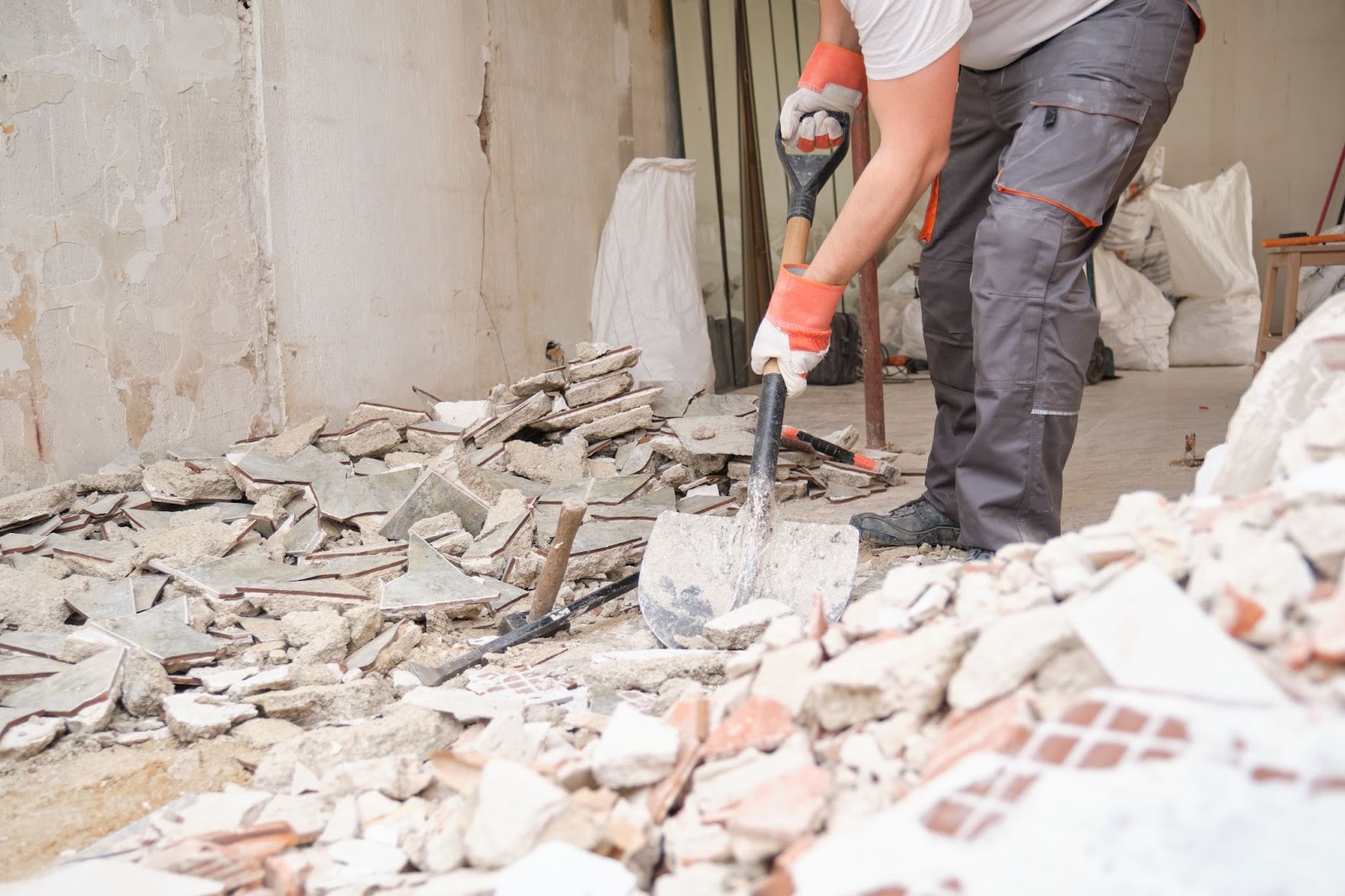
What Junk Removal Insurance Do You Need?

As a junk remover, you make your living getting rid of the items your clients don’t want to deal with. Your business is the poster child for the saying, “One man’s trash is another man’s treasure.” It’s an essential job that most people don’t want to do.
But, how does your insurance coverage look?
Some insurance policies are suggested for financial protection, but others are necessary for professional junk removers.
Keep reading to learn which ones you absolutely need and which you might want.
Learn how to obtain self-employment insurance in your field:
Freelance Disability Insurance | Freelance Ghost Insurance | Freelance Workers Comp Insurance | Freelance Critical Illness Insurance | Freelance E&O Insurance | Freelance Airbnb Host Insurance | Freelance Commercial Auto Insurance | Freelance Commercial Property Insurance | Freelance Utah Home Insurance | Freelance Amazon Flex | Freelance Carpet Cleaning Insurance | Freelance Window Cleaner Insurance | Freelance Pressure Washer Insurance | Freelance Electrician Insurance | Freelance Mechanic Insurance | Freelance Bartender Insurance | Freelance Hair Stylist Insurance | Freelance Barber Insurance | Freelance Taskers Insurance | Freelance Web Designer Insurance | Freelance Doordash Driver Insurance | Freelance Uber Driver Insurance | Freelance Plumber Insurance | Freelance Writer Insurance
1. General Liability: A Must
Most days go smoothly for the typical junk remover. However, the job can get dangerous from time to time. You and your subcontractors operate heavy equipment and work around other people’s property. If something happens to someone or their property during the job, they can sue your company.
Why Every Junk Removal Business Needs General Liability Coverage
Here are two common accident scenarios:
- You damage a client’s property. For example, the edge of a metal pole scratches their car as they carry it down their driveway, causing thousands of dollars of property damage.
- Your client suffers an injury due to your negligence. They trip over a piece of junk you placed on the ground and break an arm. They sue you for medical expenses and other damages.
General liability insurance (sometimes called professional liability insurance) covers both situations. In addition, a public liability insurance policy covers property damage, bodily injury, and advertising injuries. Therefore, it is essential for every debris removal business.
How Much Insurance Do You Need?
Policy limit guidelines are state-specific, but haulers that remove hazardous materials must increase their limits. The recommended amount is $1 million for a single-limit bodily injury and property damage occurrence, with $2 million for aggregate coverage. Check your insurance quote to see how much it costs to increase these limits. Hazardous waste damage can become costly. But it’s worth it if it only costs a few dollars a month to have more pollution liability coverage.
2. Commercial Auto Liability: A Must

Auto insurance is required by law in every state. You’ll need to upgrade your coverage to a commercial auto policy to use your vehicle to perform commercial work. For example, you’ll want a large, durable truck to haul enough junk to build a lucrative business for yourself. Of course, a pick-up truck works, but if you can nab a bigger vehicle that carries a heavier load, you’ll get to take on heavyweight jobs that pay more.
Side Question: What’s the Best Vehicle for a Junk Removal Company?
Most junk haulers don’t invest in a brand-new trucks. Instead, second-hand vehicles are better for junk removal, as spills, dirt, and dents are common in this field. You’ll probably want to invest in a dump truck or a truck with an attached trailer. Commercial auto insurance rates will vary depending on which type you choose. Either one will get you a good return on your investment over time. In addition, you can work more efficiently with a bigger vehicle and save on fuel.
Insurance Coverage for Your Junk Removal Vehicle
You’ll face hefty fees if you’re in an accident with a full load in your junk truck. Your commercial auto policy covers any bodily injuries, vehicle damage, and property damage caused by your car. At a minimum, you should have at least $1 million in policy limits. Talk to your insurance agent to see what your policy covers. You may need to add spillage riders to cover damage caused by spillage from your truck.
Some insurance companies won’t cover hazardous waste damage from an auto accident. So ensure you know that you are surrounded by general liability, commercial auto, or another insurance plan before you start hauling anything classified as hazardous.
3. Workers’ Compensation: A Must
Getting a workers’ compensation insurance policy as soon as you hire one employee would be best. Liability insurance covers damage to non-employees hurt on the job; a workers’ comp covers employees. Independent contractors who work alone don’t need workers’ comp coverage, but it offers financial protection that will be useful in an emergency.
Workers’ Comp Insurance for Junk Removal Businesses
The job of a junk hauler includes heavy lifting, operating large machinery, and many other hazards. Unfortunately, you won’t always be able to keep your employees safe from every potential accident. You must provide each person with proper training, reliable equipment, and protection in case they get injured. In addition, without workers’ comp coverage, you’ll be responsible for their medical expenses, lost wages, and other damages.
State and Federal Workers’ Comp Requirements
Can you get around not carrying this type of policy? The answer is no, not really. Workers’ compensation insurance is required at the federal level and regulated at the state level. Some states make it mandatory if you have one employee, while others allow you to have up to three before you need coverage. You could face penalties ranging from a stiff fine to jail time if caught without an active policy. Workers’ comp provides employees with income and medical expense coverage if they cannot work due to illness or injury.
Policy Limit Suggestions
The minimum mandatory policy limits are set by the state where you operate. For instance, South Carolina requires a minimum of $25,000 for bodily injury coverage per person, with a cap of $50,000 for multiple people injured in the same incident. Of course, as with all types of insurance, you can always increase the coverage and the limits. It doesn’t help you immediately, but it allows your employees to get better care if they’re seriously injured.
4. Commercial Property: A Should
What happens if your trailer or another piece of equipment is damaged? Can you afford to go without work while waiting for it to be fixed or replaced? As the owner of a junk removal company, those costs hit your pocket directly. Commercial property insurance is the buffer between the damage and your bank account.
Commercial Business Insurance Coverage
This insurance covers any damage to your property, whether it’s your office, a warehouse, or the fences around your yard. For example, say a catastrophic storm rolls through and destroys your home office. Your homeowners’ policy may exclude coverage, but your commercial business insurance covers those damages. Commercial property insurance covers many types of damage excluded by auto and general liability policies. It’s a form of equipment insurance that protects your livelihood, even if the damage is caused by fire, vandalism, or theft.
Consider a “BOP”
Check with your insurance agency to see if they offer a business owner’s policy or a BOP. These policies provide multiple types of coverage under one insurance plan. In your case, you would want to include general liability, property insurance, and debris removal insurance coverage. You might also have business interruption coverage in your policy. For example, it pays you wages if an injury or property damage prevents your junk removal company from operating.
5. Health Insurance Coverage: A Should

As a business owner, you don’t get “sick days.” You’re in charge of your health, so visiting the doctor for wellness checkups and preventative care is vital. The sooner you can catch a potentially dangerous condition, the easier it is to fix it. The Affordable Care Act requires businesses with more than 50 employees to provide health insurance to their workers. Freelancers working alone or with subcontractors don’t have to provide health insurance.
You do need your protection, though.
Types of Healthcare Policies
What kind of healthcare coverage do you currently have? For example, is it enough to cover hospital bills if you break a bone or have a heart attack? Will it cover any medications your doctor prescribes? The good news is you don’t have to pay for an arm and a leg to fix your arm or leg (or any body part). The Healthcare Marketplace offers self-employed business owners inexpensive insurance coverage.
There are other options, too:
Indemnity Insurance
Indemnity plans give you the freedom to see any healthcare provider you want. Once you meet your deductible, your insurance company pays part of each service, and you cover the rest through coinsurance.
For the best rates, head over to Selfgood.
Selfgood partners with Aetna’s First Health provider network to ensure that gig workers like you stay healthy and productive. You get the benefits of a significant company policy without the drawbacks of working for someone else. Going for an insurance policy with a high deductible is much cheaper. However, if you can find one you like in your price range, there are ways to cushion the blow of that considerable out-of-pocket expense, like supplemental policies.
Supplemental Policies
You’ve heard of supplemental insurance companies like AFLAC. These types of coverage aren’t insurance policies, but they pay you a lump sum if you are injured or diagnosed with a specific condition covered under the policy. Here’s a common scenario where supplemental coverage comes in handy:
- Your limited indemnity policy has a $2,000 deductible but an affordable premium. So for a few dollars extra per month, you add a supplemental policy that pays you $2,000 if you break a bone.
- You’re in a minor accident in a few months and break an arm. That $2,000 you get from the supplemental policy covers your deductible.
It’s impossible to account for every potential scenario. Thus, you can take out supplemental coverage for catastrophic events. Otherwise, you face paying the full deductible at one time. In short, covering the gaps in your health plan or indemnity insurance coverage is inexpensive.
Sign up for Selfgood to access supplemental health coverage and other benefits today!
Conclusion
Buying insurance is part of your job as a business owner. Some types of coverage are essential to your junk removal services business, and others are just plain smart to have. With these five coverages, you can safely go through the day knowing you’re covered in any potential situation. Use Selfgood to supplement your healthcare coverage, and check out the many other benefits your membership offers you while you’re there!
Learn about all of the benefits Selfgood members receive:
Subscribe To SelfGood
Get up to date perks and Gigworker news. Easy. Simply. SelfGood. Subscribe.





